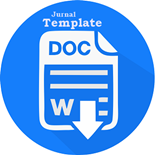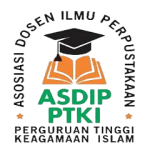Implementasi Gerakan Literasi Sekolah (GLS) Sebagai Upaya Meningkatkan Keterampilan Membaca Dan Menulis Di SMA Negeri 3 Batusangkar
Abstract
This study aims to describe the form of implementation of the school literacy movement, the supporting and inhibiting factors and to determine the role of the library in the implementation of the GLS as an effort to improve reading and writing skills at SMA Negeri 3 Batusangkar. The research method in this research is descriptive qualitative. Data collection techniques in this study by observation, interviews, and documentation. Data analysis techniques are data reduction, data display and conclusion drawing. The validity of the data in this study used triangulation techniques, sources and lengthened observations. Results: The form of GLS implementation at SMA Negeri 3 Batusangkar is in the form of programs related to reading, writing and speaking literacy for students. Supporting factors: active role of school community, program, students, support from parents and school committee, conducive school environment, facilities. inhibiting factors: the consistency of the organizers, the condition of books that are starting to deteriorate due to age, and the limited number of collections of fiction books to support the School Literacy Movement in the literacy corner, not all students have the same interest and love for literacy, time allocation, and socialization of the GLS program. The role of the library in the implementation of the GLS is that the library acts as a source of information, the library plays a role in collecting student work and preserving it, the library acts as a non-formal educational institution.
Full Text:
PDFReferences
Ahmadi, F., & Ibda, H. (2018). Media Literasi Sekolah: Teori dan Praktik. Pilar Nusantara.
Ahmadi, R. (2014). Metodologi Penelitian Kualitatif. Ar-Ruzz Media.
Faizah, D. U., Sufyadi, S., Anggraini, L., Waluyo, & Dewayani, S. (2016). Panduan Gerakan Literasi Sekolah Di Sekolah Dasar. Direktorat Jenderal Pendidikan Dasar dan Menengah Kementerian Pendidikan dan Kebudayaan.
Ahmadi, F., & Ibda, H. (2018). Media Literasi Sekolah: Teori dan Praktik. Pilar Nusantara.
Ahmadi, R. (2014). Metodologi Penelitian Kualitatif. Ar-Ruzz Media.
Faizah, D. U., Sufyadi, S., Anggraini, L., Waluyo, & Dewayani, S. (2016). Panduan Gerakan Literasi Sekolah Di Sekolah Dasar. Direktorat Jenderal Pendidikan Dasar dan Menengah Kementerian Pendidikan dan Kebudayaan.
Ghony, M. D., & Almanshur, F. (2016). Metode Penelitian Kualitatif. Ar-Ruzz Media.
Insani, R. (2020). Penguatan Sisi Hulu Dalam Rangka Peningkatan Indeks Literasi Masyarakat Indonesia. Kembangkan Budaya Baca Dan Indeks Literasi Masyarakat Indonesia.
Moleong, L. J. (2006). Metodologi Penelitian Kualitatif. PT Remaja Rosdakarya.
Munirah. (2019). Pengembangan Keterampilan Menulis Paragraf. Deepublish.
Sugiyono. (2013). Metode Penelitian: Kuantitatif, Kualitatif dan R&D. Alfabeta.
Sugiyono. (2016). Memahami Penelitian Kualitatif. Alfabeta.
Suwandi, S. (2019). Pendidikan Literasi: Membangun Budaya Belajar, Profesionalisme Pendidik, dan Budaya Kewirausahaan untuk Mewujudkan Marwah Bangsa. Remaja Rosdakarya.
Wiedarti, P. (2019). Panduan Gerakan Literasi Sekolah di SMA. Direktorat Pembinaan Sekolah Menengah Atas.
DOI: http://dx.doi.org/10.31958/jipis.v1i1.5946
Refbacks
- There are currently no refbacks.
Copyright (c) 2022 JIPIS: Jurnal Ilmu Perpustakaan dan Informasi Islam

This work is licensed under a Creative Commons Attribution-NonCommercial 4.0 International License.
JIPIS content about: library science, library scientific communication, library information and technology, archives and documentation, digital libraries, library management, knowledge management, digital and information literacy, information services in libraries
Indexed By:
JIPIS: Jurnal Ilmu Perpustakaan dan Informasi Islam - distribute under Lisensi Creative Commons Atribusi-NonKomersial 4.0 Internasional






_.png)









